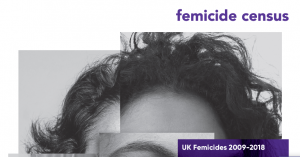The Femicide Census was started in 2015 in collaboration with Women’s Aid, law firm Freshfields Bruckhaus Deringer, and Deloitte. This census was in response to the lack of official data from the UK government and an unwillingness to look at the problem of men’s fatal violence against women and girls as a coherent issue.
The first report published in 2016 was called ‘Redefining an Isolated Incident: An Analysis of the Deaths of Women Killed Between 2009 and 2015, in 2016.‘ In the 10 year period covered in the UK 1,425 women’s lives have been taken by men. The current report also shows that ‘Of the men who killed women, as recorded in this report, 29 (2%) are known to have killed before. In twenty cases they had killed women, in nine cases other men.’ additionally a further ‘117 suspicious deaths of women involving violent incidents or histories of violence where for various reasons the death could not be attributed to the suspected perpetrator or his actions.’
The authors indicate that little has changed over a 10 year period in the rate of femicide, the methods used or the context and relationships with men who murdered them.
The report comprehensively covers a number of areas related to femicide including:
Report areas, police areas, victim’s (relationship to perpetrator, locations, methods of killing, victims country of birth, occupation age, disability health and substance use issues) and perpetrator (country of birth, age bands, occupation, history of violence against women, if they have killed before) and findings on the criminal justice outcomes, methods and media representations of the murders.
The report makes recommendations these include:
Challenge to sex-based structural inequality and the recognition of the importance of socially constructed gender/sex role stereotypes in the UK
That the scene of a death of a woman should be secured and treated as a crime scene and a robust and thorough interrogation of the relationship and dynamics of the parties and their histories should be undertaken.
Support Services for women subjected to male violence should be prioritised includes increased funding including services
Targeting women from Eastern European and post-communist/post-Soviet nations and women at risk of trafficking and prostitution
You can access the full report here.

